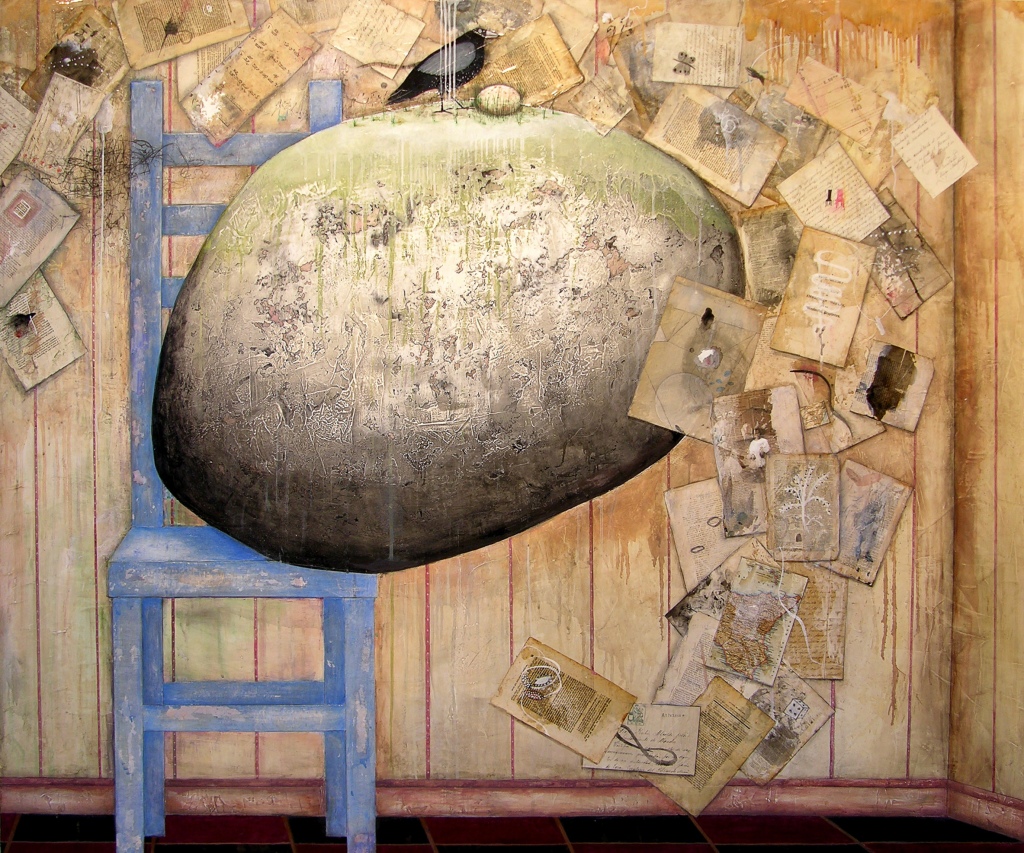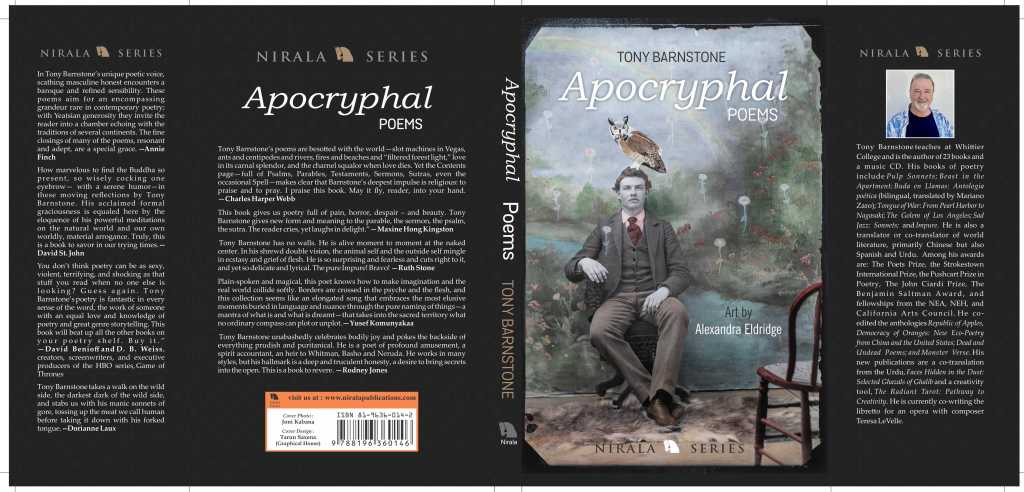In Apocryphal Poems, Tony Barnstone tells all the truth, but tells it slant, creating a world like ours but seen refracted in a slightly skewed mirror. Here are imaginary sciences, apocryphal religions, our mortality sprouting into new life, strange philosophies. Here is the Buddha as a flight of neutrinos, beach partiers in Florida as stars being swallowed by a black hole, the beast of the Apocalypse emerging from the labyrinth in the guise of AI, love manifesting as oxytocin and vasopressin, those groovy hormones. “Everything possible to be believed is an image of truth” writes William Blake, and in the refracting mirror of these poems our world shatters to reflect our strangeness, multiplicity and changing masks of life in the 21st century.
10 years and above
152
978-8196360146
January 1, 2024
English
Nirala Publication
Secure Transaction
Fast Delivery
In Apocryphal Poems, Tony Barnstone tells all the truth, but tells it slant, creating a world like ours but seen refracted in a slightly skewed mirror. Here are imaginary sciences, apocryphal religions, our mortality sprouting into new life, strange philosophies. Here is the Buddha as a flight of neutrinos, beach partiers in Florida as stars being swallowed by a black hole, the beast of the Apocalypse emerging from the labyrinth in the guise of AI, love manifesting as oxytocin and vasopressin, those groovy hormones. “Everything possible to be believed is an image of truth” writes William Blake, and in the refracting mirror of these poems our world shatters to reflect our strangeness, multiplicity and changing masks of life in the 21st century.
Tony Barnstone’s poems are besotted with the world—slot machines in Vegas, ants and centipedes and rivers, fires and beaches and “filtered forest light,” love in its carnal splendor, and the charnel squalor when love dies. Yet the Contents page—full of Psalms, Parables, Testaments, Sermons, Sutras, even the occasional Spell—makes clear that Barnstone’s deepest impulse is religious: to praise and to pray. I praise this book. May it fly, reader, into your hand.
—Charles Harper Webb
This book gives us poetry full of pain, horror, despair – and beauty. Tony Barnstone gives new form and meaning to the parable, the sermon, the psalm, the sutra. The reader cries, yet laughs in delight.”
— Maxine Hong Kingston
Tony Barnstone has no walls. He is alive moment to moment at the naked center. In his shrewd double vision, the animal self and the outside self mingle in ecstasy and grief of flesh. He is so surprising and fearless and cuts right to it, and yet so delicate and lyrical. The pure Impure! Bravo!
— Ruth Stone
Plain-spoken and magical, this poet knows how to make imagination and the real world collide softly. Borders are crossed in the psyche and the flesh, and this collection seems like an elongated song that embraces the most elusive moments buried in language and nuance through the pure naming of things—a mantra of what is and what is dreamt—that takes into the sacred territory what no ordinary compass can plot or unplot.
— Yusef Komunyakaa
Tony Barnstone unabashedly celebrates bodily joy and pokes the backside of everything prudish and puritanical. He is a poet of profound amusement, a spirit accountant, an heir to Whitman, Basho and Neruda. He works in many styles, but his hallmark is a deep and truculent honesty, a desire to bring secrets into the open. This is a book to revere.
— Rodney Jones
In Tony Barnstone’s unique poetic voice, scathing masculine honest encounters a baroque and refined sensibility. These poems aim for an encompassing grandeur rare in contemporary poetry; with Yeatsian generosity they invite the reader into a chamber echoing with the traditions of several continents. The fine closings of many of the poems, resonant and adept, are a special grace.
— Annie Finch
How marvelous to find the Buddha so present, so wisely cocking one eyebrow—with a serene humor—in these moving reflections by Tony Barnstone. His acclaimed formal graciousness is equaled here by the eloquence of his powerful meditations on the natural world and our own worldly, material arrogance. Truly, this is a book to savor in our trying times. –
— David St. John

You don’t think poetry can be as sexy, violent, terrifying, and shocking as that stuff you read when no one else is looking? Guess again. Tony Barnstone’s poetry is fantastic in every sense of the word, the work of someone with an equal love and knowledge of poetry and great genre storytelling. This book will beat up all the other books on your poetry shelf. Buy it.”
— David Benioff and D. B. Weiss, creators, screenwriters, and executive producers of the HBO series, Game of Thrones
Tony Barnstone takes a walk on the wild side, the darkest dark of the wild side, and stabs us with his manic sonnets of gore, tossing up the meat we call human before taking it down with his forked tongue.
–Dorianne Laux

Tony Barnstone teaches at Whittier College and is the author of 23 books and a music CD. His books of poetry include Pulp Sonnets; Beast in the Apartment; Buda en Llamas: Antología poética (bilingual, translated by Mariano Zaro); Tongue of War: From Pearl Harbor to Nagasaki; The Golem of Los Angeles; Sad Jazz: Sonnets; and Impure. He is also a translator or co-translator of world literature, primarily Chinese but also Spanish and Urdu. Among his awards are: The Poets Prize, the Strokestown International Prize, the Pushcart Prize in Poetry, The John Ciardi Prize, The Benjamin Saltman Award, and fellowships from the NEA, NEH, and California Arts Council. He co-edited the anthologies Republic of Apples, Democracy of Oranges: New Eco-Poetry from China and the United States; Dead and Undead Poems; and Monster Verse. His new publications are a co-translation from the Urdu, Faces Hidden in the Dust: Selected Ghazals of Ghalib and a creativity tool, The Radiant Tarot: Pathway to Creativity. He is currently co-writing the libretto for an opera with composer Teresa LeVelle.


Nirala Publications, 4637/20, Third Floor, Unit No 310, Hari Sadan, Ansari Road, Daryaganj, New Delhi 110002 India
Tel: +911135946201, 09953726773, 7827866599
Sign up for our newsletter to receive special offers and events.
niralapublications@gmail.com

Copyright © 2024 Nirala Publications
Designed & Developed with ♥ By Hemant Bhatta
Reviews
There are no reviews yet.